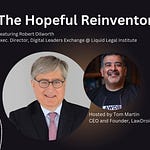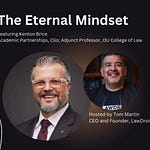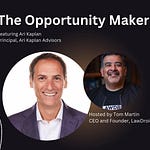Hey there Legal Rebels! 👋 I’m excited to share with you the 39th episode of the 2025 season of the LawDroid Manifesto podcast, where I will be continuing to interview key legal innovators to learn how they do what they do. I think you’re going to enjoy this one!
If you want to understand how regulatory innovation can transform access to justice and learn from someone who turned persistence into systemic change, you need to listen to this episode. Jordan is at the forefront of reimagining legal regulation and has demonstrated how patience, collaboration, and bold thinking can reshape how legal services are delivered.
Transforming Legal Services Through Entity-Based Regulation
Join me as I interview Jordan Couch, partner at Palace Law and a key architect of Washington State’s groundbreaking regulatory pilot program.
In this insightful podcast episode, Jordan shares his unconventional path from small-town Montana through NASA’s legal department to becoming a driving force behind Washington State’s entity-based licensing framework. He dives deep into the seven-year journey of regulatory reform, explaining how Washington moved from outdated UPL definitions to a flexible pilot program that allows innovative legal service delivery models to be tested and measured. Jordan also demonstrates the practical connection between regulatory innovation and the access to justice crisis, making the case that 85% of people with legal needs are currently underserved not because lawyers don’t care, but because the business model and regulatory framework are fundamentally broken.
His stories and insights underscore the importance of viewing regulatory change not as a threat to lawyers but as an opportunity to serve more people more effectively. This episode is a must-watch for anyone interested in the future of legal services, offering valuable perspectives on how small incremental improvements can compound into transformative change.
The Skinny
Jordan Couch, partner at Palace Law in Tacoma, Washington, shares his remarkable journey from fishing lodges in Montana through NASA’s legal department to becoming a central figure in Washington State’s regulatory innovation efforts. With a practical, team-oriented approach honed through years of bar association work, Jordan has spent seven years helping to shepherd Washington’s entity-based licensing pilot program from initial concept to Supreme Court approval. Throughout the conversation, Jordan emphasizes that the access to justice crisis isn’t about lawyers being unwilling to help, it’s about a broken business model designed for big firms serving corporate clients that simply doesn’t work for solo and small practitioners serving consumers. His passion stems from a deep-rooted desire to help people, combined with an understanding that regulatory barriers prevent lawyers from offering the range of services people actually want and need, not just full-representation for high-value cases.
Key Takeaways:
Jordan’s path to law was unconventionally inspired by seeing his fishing guide father’s high school debate photos, demonstrating how seemingly small moments can shape career trajectories
His experience at NASA exposed him to both routine legal work and extraordinary questions about international space law, teaching him to balance the mundane with the innovative
Washington State’s seven-year regulatory reform journey involved multiple failed proposals before arriving at the current entity-based licensing pilot program
The new framework allows entities to propose innovative legal service delivery models that will be tested and measured rather than prescribing specific rule changes
Jordan emphasizes that access to justice isn’t about everyone hiring lawyers, it’s about providing people with the legal information and resources tailored to what they actually need
Solo and small firm practitioners are struggling not because of competition from LegalZoom, but because they’re using a business model designed for big firms serving corporate clients
The concept of Baumol’s cost disease explains why legal services keep getting more expensive while lawyers make less money, without efficiency gains, the billable hour model is fundamentally broken
Washington’s regulatory pilot program is expected to begin accepting applications in October 2025, with Jordan planning to participate
Work-life balance works best when driven by passion, if you’re passionate about what you’re doing, you’ll find time for all the important things
The meaning of helping people, as Kurt Vonnegut’s son said, is simply “to help each other get through this thing, whatever it is”
Notable Quotes:
“Seven years later, we finally passed a pilot project to test into deregulation in Washington to allow legal entities to offer legal services. And I’ve been working on this project in various roles with various bar associations throughout the process of the seven years, which has been a fascinating journey.” - Jordan Couch (02:09-02:37)
“No one is going to solve the access to justice problem, right? But there are a lot of things like pro bono work that can make it a little bit better, 1% better. And if we do a lot of those 1% things, and so this proposal isn’t saying, here’s our solution. This proposal is saying, you tell us your idea, and we’ve created a framework to test your idea and see if it works.” - Jordan Couch (04:39-04:59)
“I think Washington’s proposal is really unique. We have the fortunate role of following others so we can kind of see what works in other places... what makes Washington’s really unique is this focus on both access to justice and really being an open experiment.” - Jordan Couch (03:40-04:04)
“If we have a safe framework to test these things and are open to the possibilities that, you know, it might work, I think that makes a big difference there, right? Because so often people do say like, oh, well, you know, we need more pro bono work. We need to do this. We need to do that. And like, those are all good things, but we can’t stand in the way of other people trying to solve the problem.” - Jordan Couch (05:44-06:02)
“If your definition of the practice of law includes handing someone a court approved packet of already printed forms that they ask for, you need to change the definition of the practice of law. Like that exception shouldn’t be there. That means your law is written poorly.” - Jordan Couch (33:59-34:18)
“The analogy I always give is, you know, lawyers are selling Lamborghinis and we’re banning the sale of Honda Civics and bicycles.” - Jordan Couch (38:08-38:15)
“If you tell sole and small firm practitioners you want to, you know, build help competitors to them, they’re going to be upset about that, right? Because they see this as competition, not as opportunity. And they’re already struggling. The problem is, you know, we need to educate those sole and small firm practitioners that the reason you’re struggling is not because LegalZoom is taking away your clients. Those people were never going to hire you.” - Jordan Couch (39:41-40:01)
“Nine out of 10 people studies will show who have a valid injury claim will never follow through with getting what they’re entitled to. So no, we do have an access to justice crisis.” - Jordan Couch (41:23-41:35)
“Nobody wants an attorney or a judge or a courtroom. They want help with their problem that happens to be regulated by the legal system, right? Like by the laws of this country. That’s what they want.” - Jordan Couch (43:34-43:44)
“I only pick the projects that I’m passionate about. And because I’m passionate about them, I get them done. I find the way to make it work because it’s occupying my mind, whether I’m physically working on it or not.” - Jordan Couch (44:46-44:59)
Clips
If Your Law Needs Exceptions, It’s Written Wrong
The Job That Didn’t Exist—Until It Did
Don’t Chase Perfection, Test Bold Legal Ideas
No One Wants a Lawyer—They Want Results
Jordan’s journey from small-town Montana to the forefront of regulatory innovation demonstrates how persistence, collaboration, and genuine passion for access to justice can create systemic change. His willingness to spend seven years working on regulatory reform, through multiple failed proposals and countless stakeholder meetings, shows the kind of long-term thinking required to transform how legal services are delivered.
What stands out most is Jordan’s ability to reframe the conversation around regulatory change. Rather than viewing entity-based licensing or AI tools as threats to lawyers, he sees them as opportunities to serve the 85% of people who currently go without legal help. By understanding the economics underlying the access to justice crisis—particularly Baumol’s cost disease, he makes a compelling case that the current system isn’t sustainable for lawyers or clients.
Closing Thoughts
As someone who’s been advocating for legal innovation for years, I find Jordan’s story both inspiring and instructive. He represents a new generation of lawyer-innovators who understand that changing the system requires working within it, building relationships, and maintaining passion through years of slow progress.
What excites me most about Washington’s entity-based licensing pilot is how it embodies the experimental mindset Jordan describes, making the system 1% better through multiple small innovations rather than waiting for a perfect solution. The framework doesn’t prescribe what innovation should look like; it creates space for lawyers and entrepreneurs to propose ideas, test them, and measure their impact on access to justice.
For our Legal Rebels community, Jordan’s seven-year journey offers a masterclass in effective advocacy. Change doesn’t happen overnight, and it rarely looks like the initial proposal. It requires building coalitions, listening to critics, being willing to scrap your own ideas when better ones emerge, and maintaining focus on the ultimate goal: helping people access the legal help they need.
The fact that Washington is expected to begin accepting applications this October represents a watershed moment for legal services. As Jordan and others begin participating in this pilot program, we’ll finally get real-world data on whether new service delivery models can effectively serve the underserved while maintaining ethical standards and consumer protection.
As Jordan reminds us, quoting Kurt Vonnegut’s son, the meaning of life is simply “to help each other get through this thing, whatever it is.” In legal services, that means creating systems that actually help people with their problems rather than protecting outdated business models that serve lawyers more than clients.












